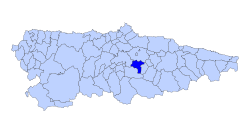Langreo
Langreo
Llangréu | |
|---|---|
| Llangréu / Langreo | |
 The town of Langreo at the Nalón Valley | |
 Location of Llangreu | |
| Coordinates: 43°18′N 5°41′W / 43.300°N 5.683°W | |
| Country | |
| Autonomous community | |
| Province | Asturias |
| Comarca | Nalón |
| Government | |
| • Mayor | Roberto García Rodríguez (IU) |
| Area | |
• Total | 82.46 km2 (31.84 sq mi) |
| Elevation | 1,021 m (3,350 ft) |
| Population (2018)[1] | |
• Total | 39,984 |
| • Density | 480/km2 (1,300/sq mi) |
| Demonym | Langreanos |
| Time zone | UTC+1 (CET) |
| • Summer (DST) | UTC+2 (CEST) |
| Dialing code | 33930(District of La Felguera)
33900(District of Sama) 33920(District of Riaño) 33909(District of Ciaño) 33934(District of Lada) |
| Official language(s) | Asturian and Spanish |
| Website | Official website |
Langreo (Spanish pronunciation: [laŋˈɡɾeo]) or Llangréu (Asturian pronunciation: [ʎaŋˈɡɾew]) (Asturian)[2] is a municipality and town in northern Spain, in Asturias. It is the 4th largest town of Asturias with 43,000 inhabitants. Langreo is located in the centre of Asturias, approximately 20 kilometres (12 miles) south-east of Oviedo. It was an important mining and metallurgical center.
In the neighbourhood fruit and cider are produced, and there are still important coal mines, foundries, and factories for the manufacture of coarse cloth.
History
[edit]
According to a legend Langreo was the place where the Moorish governor Munuza was killed while trying to flee from Asturias at the beginning of the Reconquest. Langreo was settled by the Romans, who built a large Roman bridge that is not conserved today.
In the past, it was one of the most important mining and metallurgical points of Spain since the 18th century, and it was also well known because of workers struggles and its cultural life. The 3rd railway to be built in the Iberian Peninsula was the FC of Langreo. The Factory of La Felguera was one of the most important iron works centers in Spain, and the Langreo mines was well known in whole the country.
Because of the Spanish "Industrial Restructuring", Langreo lost its industrial importance, but today the town hosts Bayer, where 100% of the acetylsalicylic acid of the German enterprise are produced. Langreo also holds the technologies centre Valnalón.
Langreo has historic monuments like the church of San Esteban, the Quintana Tower or the Sanctuary of Carbayu. Also preserves good examples of its industrial heritage and it hosts the Siderurgy Museum Of Asturias within the old Felguera Factory, the Samuño Valley and Railway Mining Museum, and the art gallery Pinacoteca Eduardo Úrculo.
Langreo celebrates fiestas of San Pedro and Santiago, and special gastronomic days: Carnival (February) Cider (April) and Fabada (December).
The largest town is Langreo formed by the most important districts: La Felguera (20,000 inhabitants), Sama (10,000), and Riaño, Ciaño, Lada and Barros, also known as parishes.
Parishes
[edit]There are eight parishes (administrative divisions) by population:
Politics
[edit]Local elections
| |||||||||||
| Party/List | 1979 | 1983 | 1987[3] | 1991[3] | 1995[3] | 1999[3] | 2003[3] | 2007[3] | 2011[4] | 2015[3] | 2019[3] |
| FSA-PSOE | 10 | 14 | 10 | 11 | 8 | 9 | 8 | 10 | 7 | 6 | 9 |
| PCE / IU-BA | 7 | 6 | 7 | 9 | 10 | 11 | 7 | 5 | 4 | 6 | |
| Somos | 5 | ||||||||||
| CD / AP / PP | 2 | 5 | 4 | 4 | 7 | 5 | 6 | 6 | 4 | 3 | 2 |
| C’s | 1 | 2 | |||||||||
| FAC | 4 | ||||||||||
| FDLI | 2 | ||||||||||
| UCD / CDS | 6 | 0 | 4 | 1 | |||||||
| Unidas (Somos+IU) | 8 | ||||||||||
| Total | 25 | 25 | 25 | 25 | 25 | 25 | 21 | 21 | 21 | 21 | 21 |
People
[edit]
- David Villa, footballer
- Manuel Mejuto González, football referee
- Pedro Duro, businessman
- Aurelius of Asturias, King of Asturias
- Gaspar García Laviana, soldier
- Mario Cotelo, footballer
- Alberto Coto García, mental calculator
- Dámaso Alonso, poet
- Narciso Ibáñez Menta, actor
- Jesús Fernández Duro, sportman
- María Neira, WHO doctor
- Carlos Álvarez-Nóvoa, actor
Gallery
[edit]-
Orthophotomap of Langreo
-
Museum of the Siderurgy of Asturias
-
Langreohotel Hotel
-
Samuño Mining and Railway Museum
-
Catholic Sanctuary of El Carbayu
-
Town hall
-
García Lago public park
References
[edit]- ^ Municipal Register of Spain 2018. National Statistics Institute.
- ^ "Decree 73/2005, of 7 July, establishing the official names of the Council of Langreo". Archived from the original on 19 February 2012. Retrieved 1 December 2014.
- ^ a b c d e f g h Dirección General de Política interior
- ^ Elecciones Locales 2011
External links
[edit]This article incorporates text from a publication now in the public domain: Chisholm, Hugh, ed. (1911). "Langreo". Encyclopædia Britannica. Vol. 16 (11th ed.). Cambridge University Press. p. 177.










